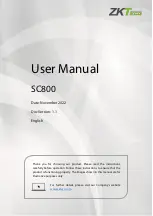
Port Mapping Controller Operation
702
SLAU356I – March 2015 – Revised June 2019
Copyright © 2015–2019, Texas Instruments Incorporated
Port Mapping Controller (PMAP)
The mapping is device-dependent; see the device-specific data sheet for available functions and specific
values. The use of mapping mnemonics to abstract the underlying PxMAPy values is recommended to
allow simple portability between different devices.
shows some examples for mapping
mnemonics of some common peripherals.
All mappable port pins provide the function PM_ANALOG (0FFh). Setting the port mapping register
PxMAPy to PM_ANALOG together with PxSEL.y = 1 disables the output driver and the input Schmitt-
trigger, to prevent parasitic cross currents when applying analog signals.
Table 13-1. Examples for Port Mapping Mnemonics and Functions
PxMAPy Mnemonic
Input Pin Function
With PxSEL.y = 1 and PxDIR.y = 0
Output Pin Function
With PxSEL.y = 1 and PxDIR.y = 1
PM_NONE
None
DVSS
PM_ACLK
None
ACLK
PM_MCLK
None
MCLK
PM_SMCLK
None
SMCLK
PM_TA0CLK
TimerA0 clock input
DVSS
PM_TA0CCR0A
TimerA0 CCR0 capture input CCI0A
TimerA0 CCR0 compare output Out0
PM_TA0CCR1A
TimerA0 CCR1 capture input CCI1A
TimerA0 CCR1 compare output Out1
PM_TA0CCR2A
TimerA0 CCR2 capture input CCI2A
TimerA0 CCR2 compare output Out2
PM_TA0CCR3A
TimerA0 CCR3 capture input CCI3A
TimerA0 CCR3 compare output Out3
PM_TA0CCR4A
TimerA0 CCR4 capture input CCI4A
TimerA0 CCR4 compare output Out4
PM_TA1CLK
TimerA1 clock input
DVSS
PM_TA1CCR0A
TimerA1 CCR0 capture input CCI0A
TimerA1 CCR0 compare output Out0
PM_TA1CCR1A
TimerA1 CCR1 capture input CCI1A
TimerA1 CCR1 compare output Out1
PM_TA1CCR2A
TimerA1 CCR2 capture input CCI2A
TimerA1 CCR2 compare output Out2
PM_TB0CLK
TimerB0 clock input
DVSS
PM_TB0OUTH
TimerB0 outputs high impedance
DVSS
PM_TB0CCR0A
TimerB0 CCR0 capture input CCI0A
TimerB0 CCR0 compare output Out0
[direction controlled by Timer_B (TBOUTH)]
PM_TB0CCR1A
TimerB0 CCR1 capture input CCI1A
TimerB0 CCR1 compare output Out1
[direction controlled by Timer_B (TBOUTH)]
PM_TB0CCR2A
TimerB0 CCR2 capture input CCI2A
TimerB0 CCR2 compare output Out2
[direction controlled by Timer_B (TBOUTH)]
PM_TB0CCR3A
TimerB0 CCR3 capture input CCI3A
TimerB0 CCR3 compare output Out3
[direction controlled by Timer_B (TBOUTH)]
PM_TB0CCR4A
TimerB0 CCR4 capture input CCI4A
TimerB0 CCR4 compare output Out4
[direction controlled by Timer_B (TBOUTH)]
PM_TB0CCR5A
TimerB0 CCR5 capture input CCI5A
TimerB0 CCR5 compare output Out5
[direction controlled by Timer_B (TBOUTH)]
PM_TB0CCR6A
TimerB0 CCR6 capture input CCI6A
TimerB0 CCR6 compare output Out6
[direction controlled by Timer_B (TBOUTH)]
PM_UCA0RXD
eUSCI_A0 UART RXD (direction controlled by eUSCI - input)
PM_UCA0SOMI
eUSCI_A0 SPI slave out master in (direction controlled by eUSCI)
PM_UCA0TXD
eUSCI_A0 UART TXD (direction controlled by eUSCI - output)
PM_UCA0SIMO
eUSCI_A0 SPI slave in master out (direction controlled by eUSCI)
PM_UCA0CLK
eUSCI_A0 clock input/output (direction controlled by eUSCI)
PM_UCA0STE
eUSCI_A0 SPI slave transmit enable (direction controlled by eUSCI)
PM_UCB0SOMI
eUSCI_B0 SPI slave out master in (direction controlled by eUSCI)
PM_UCB0SCL
eUSCI_B0 I2C clock (open drain and direction controlled by eUSCI
PM_UCB0SIMO
eUSCI_B0 SPI slave in master out (direction controlled by eUSCI)
PM_UCB0SDA
eUSCI_B0 I2C data (open drain and direction controlled by eUSCI)
PM_UCB0CLK
eUSCI_B0 clock input/output (direction controlled by eUSCI)
PM_UCB0STE
eUSCI_B0 SPI slave transmit enable (direction controlled by eUSCI)
















































